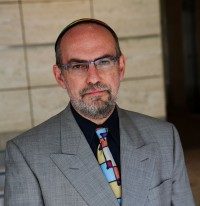“Our God and God of our ancestors: in Your glory, rule over the entire universe; in Your splendor, be exalted over all the earth; in the majestic beauty of Your overwhelming presence, appear to all the inhabitants of Your world. Then, all that You have made will recognize You as their maker, all that You created will understand that You are their creator, and all living beings will say: God, the God of Israel is sovereign, ruling over all. … Blessed are You God, ruler of all the earth, who makes the people Israel and the Day of Remembrance Holy.”
Thus ends the first section of the musaf or “additonal service” on Rosh Hashanah. It is the closing of the “sovereignty” or malkhuyot section. The liturgy is a collection of ten verses—three each from Torah, Prophets, and Writings, and then a bonus verse from Torah (the Sh’ma)—which glorify God as once and future ruler (more literally king) of the universe.
It is always striking to me when, praying as I do in an egalitarian minyan, the assembled daveners/pray-ers manage to evoke as much spirit for this section as for the others. What do we do with a sovereign ruler, a king, in the twenty first century?
I am not troubled that God is imagined as a corporeal ruler. I am much more a rabbinic than a medieval theologian and so I blessedly shelter under the canopy of the midrash that says that at Sinai God appeared as an old man, at the Sea God appeared as a warrior, and so on. God appears as what Israel needs. The real question then is do we need a king?
The simple answer is no. The more complicated answer is also no, but…
The sacred history of our people, as recorded in Torah, and in the Prophets, is a history of failed sovereignty. Pharaoh’s regime, which was founded on human slavery, went down under the weight of its injustice. However, the mediated regime of the desert, in which Moses brought the word of God to Israel, also resulted in religious and political rebellion and death. The golden calf spoke to the need to have a physical location for God; the rebellion of Korach spoke to the weakness of an egalitarian sacred community in which one person is holier than the rest. At each point there was also a failure of God’s leadership, which almost resulted in the complete destruction of the people Israel.
The various regimes in the Land of Israel also ended up—each in its own way—as failing to create the conditions for a just and holy society. The book of Judges—the book of strong women leaders yet also the book of the rape of the concubine of Gibeah, and the twisted tale of Samson’s adventures in destruction—ends with the plaintive chorus “In those days there was no king in the land, each person did as they saw fit.”
The books of Samuel and Kings inscribe the arc of monarchy—from a populist demand for a king “like all the nations,” to a victorious enthronement in Jerusalem and the building of God’s Temple as bedazzling as any royal castle, to the inevitable falling into sin, moral and religious, and finally exile. The books of the named prophets articulate the moral depths into which the people has fallen and castigate them for it—sacrifices instead of justice, fasting instead of protecting the weak and the poor, slaughtering calves upon the altar whilst committing murder in the streets of Jerusalem.
And so the Tanakh itself ends with the still unfulfilled craving for a just polity. The last book of the bible in the Jewish canon is Chronicles, which ends just before the return from exile.
When we pray for God to be the ruler of the universe, it is not any of these historical situations which we have (or need to have) in mind. Holding God up as ruler of the universe is holding a mirror up to the present forms of government and saying: “We know what justice looks like, and it doesn’t look like this.”
The last verse in the sovereignty or malkhuyot collection is from Zechariah (14:9): “God shall be acknowledged sovereign of all the earth. On that day God shall be one, and the name of God one.” God and God’s name will be unified when all people are unified (if there is only one God—then all people are one). The radical possibility of the reign of God does not mean that we crave a king—it means that we crave a just society where all are equal. The radical possibility of the reign of God means that the current ways of discrimination, impoverishment, mass incarceration, violence, war can pass—and if they can pass we are obligated to work hard to make them pass, towards that day when justice flows like a mighty stream, when the name of God is one.
Rabbi Dr. Aryeh Cohen is Professor of Rabbinic Literature at American Jewish University and a T’ruah board member. His newest book, Justice in the City: An Argument from the Sources of Rabbinic Judaism, explores issues of justice (labor, homelessness, restorative justice) from within a theory of the just city, drawn from Rabbinic sources.

